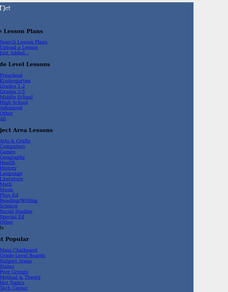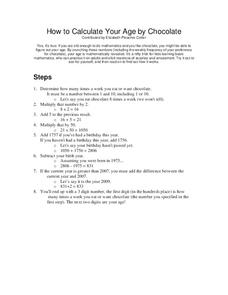Do2Learn
Magic Tricks – Following Directions Card
Following directions can be a challenging task for young children, but it can remain a challenging task for those with autism. Use a following directions activity that promotes positive behavior in your learners and allows them to focus...
Curated OER
Following Directions Using Magic Tricks
Pupils recreate magic tricks in an effort to follow directions. They evaluate the clarity of their instructions and teach an apprentice how to perform a trick. They are evaluated using a rubric to note the clarity of their directions...
Curated OER
Following Directions- October Holidays
In this October holidays following directions worksheet, 4th graders read a set of directions such as "If you like autumn color the letter O red, if not color it orange. They decide which applies to them before coloring the letters in...
Balanced Assessment
Number Trick
Show your classes the magic of numbers. Using a number trick, learners practice writing algebraic expressions. They then use their expression to perform the trick. Their exploration should help them understand the magic behind the trick.
Big Kid Science
Photographing the Eclipse Tips and Tricks Guide
Use a guide that provides safe ways for viewing the eclipse with a camera or telescope. The guide also includes tips and tricks for getting the best shot using a camera phone or SLR camera. You won't wanna miss this!
Curated OER
Following Directions- April
In this following directions worksheet, 3rd graders make 6 choices that determine how they will color the word "April" that is at the top of the worksheet.
Great Books Foundation
The Fox and the Stork
Young readers take part in a meaningful discussion following a reading of Aesop's fable "The Fox and the Stork." Five questions focus on the characters' actions and offering apologies.
Poetry4kids
How to Write a Limerick
Add a little fun and fancy to English language arts with an activity that challenges scholars to write a limerick. Authors follow five rules in order to compose an original poem that contains a specific rhyme scheme.
Curated OER
Hot Dog Clown Trick
Students explore the actions and tricks used by clowns to entertain and fool others. A clown prop is created and a trick practiced to mimic the clown's activities. The presentation is made to family members.
Curated OER
Guided Reading with Twister's Tricks
Students participate in pre-reading activities before reading the book, Twister's Tricks. They read the book independently, but are guided by directive questions from their teacher. A discussion follows, as well as repeated readings for...
EngageNY
Prove the Pythagorean Theorem Using Similarity
Amaze your classes with the ability to find side lengths of triangles immediately — they'll all want to know your trick! Learners use the Pythagorean Theorem and special right triangle relationships to find missing side lengths.
Curated OER
Hot Dog Clown Trick
Pupils make a hot dog clown prop. They create their own way of verbalizing the clown trick to others. Students comprehend what clowns do and make a trick hot dog. They plan what they are going to say and how they act while they perform...
Curated OER
Guess the Month Trick
In this math card trick worksheet, students follow the directions and learn how to perform a card trick in which the correct month is guessed. Students use a Base 2 arithmetic system.
Curated OER
Clifford Learns About the Circus and So Do We!
Students investigate the characteristics of different circus jobs and the animals commonly seen at the circus. They read a book about clowns and construct and perform a trick hot dog. Students also create a clown accordion book.
Curated OER
More Number Tricks
In this more number tricks worksheet, learners study and analyze how to use symbols to set up and solve problems. Students follow twenty directives to solve several word problems.
Curated OER
Sequencing Activities In A Procedure
Seventh graders discuss the importance of following instructions without procrastination. They explore careers where following instructions can make a difference between life and death. Students identify important details in written...
Curated OER
Domino Trick
For this domino trick worksheet, students solve and complete six different problems using domino's. First, they think of a domino and count the number of pips on the left side of the domino. Then, students multiply this number by 5 and...
Curated OER
The Houdini Box: Compare and Contrast
How did Houdini do it? After reading a short passage about magicians and their tricks, readers are asked to compare and contrast some of the illusions these prestidigitators create.
Curated OER
Teaching Correct Pronouns
I or me? Are your middle school grammarians struggling with pronoun case? Try this trick. Instruct your learners to look right before or right after the pronoun choice for the words and, or, nor. Have them cover the conjunction and the...
Curated OER
Heart to Heart
Candy conversation hearts make writing a sweet pastime. Fifth graders write narratives demonstrating a complete thought and correct punctuation. The trick here is that they must use the words on five candy conversation hearts as part of...
Curated OER
Getting to Know You
Need a first day ice breaker? Try this getting to know you exercise. Pupils stand in a circle and introduce themselves. The trick is they add an adjective that describes them and starts with the same letter as their first name. Add a...
Education Center
Safety Sequence
Follow up a class reading of the children's book Officer Buckle and Gloria with this simple sequence-of-events worksheet. Including pictures of six key moments from the story, young learners must first number them in the correct order...
Curated OER
Mystery Math
Here is an interesting "trick" your young mathematicians can perform. They are taught how to find any number's "digital root," by following a set of detailed instructions. The process works for any number, and is the type of math puzzle...
Curated OER
How to Calculate Your Age by Chocolate
In this math puzzle activity, students follow detailed directions to find their age. They begin with the number of times per week they eat chocolate. Their final answer tells how much chocolate they want or eat as well as their age.

























